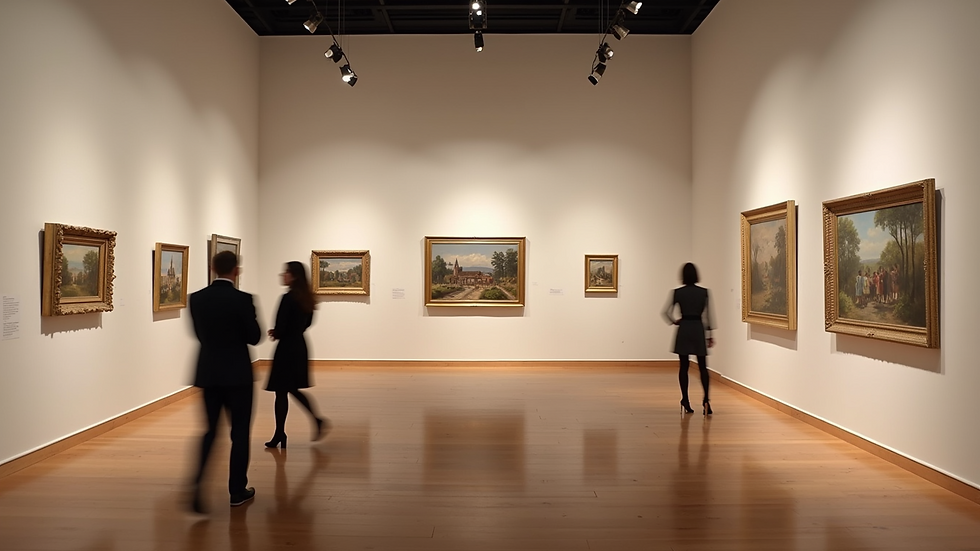Expand Your Skills with Local Art Workshops
- hanthonycsa
- Sep 23
- 3 min read
Updated: Sep 24
Art is a powerful way to express creativity, relieve stress, and develop new skills. Whether you are a beginner or an experienced artist, participating in art skill workshops can open doors to new techniques and ideas. These workshops provide hands-on experience, expert guidance, and a supportive environment to nurture your artistic talents. If you want to enhance your abilities and connect with like-minded individuals, exploring art skill workshops is a fantastic option.
Why Choose Art Skill Workshops?
Art skill workshops offer a unique learning experience compared to self-study or online tutorials. They provide direct interaction with instructors who can give immediate feedback and personalized tips. This face-to-face setting encourages experimentation and helps you overcome challenges quickly.
Some benefits of attending art skill workshops include:
Structured learning: Workshops follow a clear curriculum that builds your skills step-by-step.
Access to materials: Many workshops provide supplies, so you can try new mediums without investing upfront.
Networking opportunities: Meet other artists, share ideas, and find inspiration.
Motivation and accountability: Scheduled sessions keep you committed to practicing regularly.
Exposure to diverse styles: Learn different techniques such as watercolor, acrylic, charcoal, or mixed media.
For example, a watercolor workshop might teach you how to control washes and blend colors smoothly, while a charcoal drawing class could focus on shading and texture. These focused sessions help you master specific skills faster than working alone.

What to Expect from Art Skill Workshops
When you sign up for an art skill workshop, you can expect a welcoming environment designed to foster creativity. Workshops usually last from a few hours to several weeks, depending on the topic and depth of instruction.
Typical components of a workshop include:
Introduction and demonstration: The instructor explains the techniques and shows examples.
Guided practice: Participants try the techniques with step-by-step guidance.
Individual work: Time to experiment and create your own piece.
Group critique: Constructive feedback from the instructor and peers.
Q&A session: Opportunity to ask questions and clarify doubts.
Workshops may be held in community centers, art studios, or galleries. Some even offer outdoor sessions to capture natural light and scenery. The hands-on approach ensures you learn by doing, which is essential for developing muscle memory and confidence.
If you want to find quality workshops near you, consider checking out local art workshops. They often list upcoming classes and events tailored to different skill levels.

How do I get involved in a local art community?
Joining a local art community can greatly enhance your learning experience and provide ongoing support. Here are some practical steps to get involved:
Attend workshops regularly: Consistency helps you build relationships with instructors and fellow artists.
Visit local galleries and exhibitions: Engage with the art scene and discover new inspirations.
Join art clubs or groups: Many communities have clubs that organize meetups, critiques, and collaborative projects.
Volunteer at art events: This is a great way to meet people and learn behind-the-scenes aspects of art shows.
Use social media: Follow local artists and groups to stay updated on events and opportunities.
Being part of a community encourages you to share your work, receive feedback, and stay motivated. It also opens doors to collaborations and exhibitions that can showcase your progress.

Tips for Making the Most of Your Workshop Experience
To get the best results from art skill workshops, consider these actionable recommendations:
Come prepared: Bring any required materials and wear comfortable clothing.
Be open-minded: Try new techniques even if they seem challenging at first.
Ask questions: Don’t hesitate to seek clarification or advice.
Practice outside class: Reinforce what you learn by dedicating time to practice.
Take notes: Jot down tips and ideas to remember later.
Connect with peers: Exchange contact information to continue learning together.
Remember, progress in art takes time and patience. Workshops are stepping stones that help you grow steadily.
Exploring Different Types of Art Skill Workshops
There is a wide variety of workshops available to suit different interests and skill levels. Some popular types include:
Painting workshops: Watercolor, acrylic, oil, and gouache techniques.
Drawing workshops: Pencil, charcoal, ink, and figure drawing.
Printmaking workshops: Linocut, screen printing, and etching.
Sculpture workshops: Clay modeling, wire art, and mixed media.
Digital art workshops: Using software like Procreate or Photoshop.
Choosing a workshop that aligns with your goals will keep you motivated and excited to learn. Many studios offer beginner-friendly classes as well as advanced sessions for experienced artists.
Expanding your artistic skills through local art skill workshops is a rewarding journey. These workshops provide hands-on learning, expert guidance, and a chance to connect with a vibrant community. Whether you want to try a new medium or refine your technique, participating in workshops can inspire creativity and boost your confidence. Explore the options available near you and take the first step toward enhancing your art skills today.




Comments